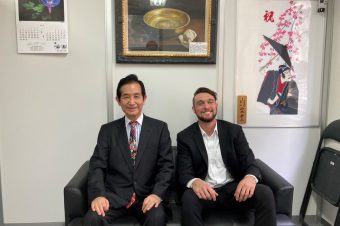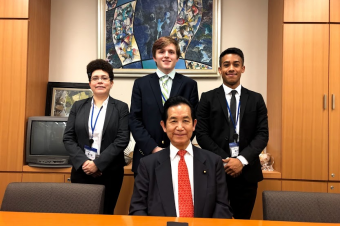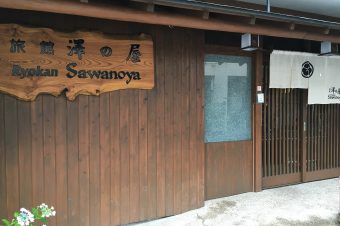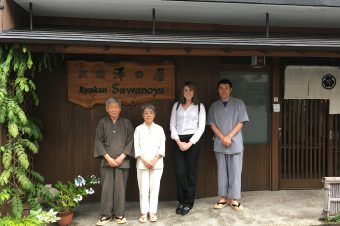Interview with Kozo Yamamoto
The following interview is between Kozo Yamamoto, MBA, Member of House of Representatives of Japan, and Michelle Alleman, Intern at JTAST, Junior at University of Central Florida. The interview took place at 16:00, June 13, 2016. Some statements have been paraphrased in order to be more clear and concise.
ALLEMAN: Hello, my name is Michelle Alleman, and today I will be interviewing Kozo Yamamoto, MBA, a member of the House of Representatives in Japan. Thank you for meeting with me today. First I would like to ask, why do you think foreign tourists choose to come to Japan? What do you think draws them to this country?
YAMAMOTO: You know, the number of tourists increased in the last three years remarkably. Before Mr. Abe took office as Prime Minister, the foreign tourist number was 8 million people. But now, last year, we approached almost 20 million tourists. So, it’s almost three times. Probably the biggest reason is because of Abenomikusu (economics policy in Japan). The yen rate became weakened. The yen to dollar rate used to be 80 yen per dollar, but now it is 116 yen per dollar. So, for foreign tourists, Japanese products have become much cheaper. And also, we actively worked on the policies to invite foreign tourists by easing the visa status. We liberalized the visa status to Asian countries like Indonesia, Thailand, Vietnam, and powerfully to Chinese. So as a result, Asian tourists felt it was much easier to get a visa to come to Japan. Our target in the past was to increase tourists to 20 million by the year 2020, but since we succeeded that goal, now we have changed that goal to 40 million for 2020, and 60 million by 2030. The reason why we would like to invite many inbound tourists is because, as you know, Japan is an aging society and the population of young people is decreasing and the population of older people is increasing. But because of Japanese culture, people have difficulties accepting foreign visitors easily. So, our goal is to rather invite so-called “short-term immigrants” to encourage the Japanese economy to grow.
ALLEMAN: Kind of like me!
YAMAMOTO: Exactly.
ALLEMAN: What would you say Japanese citizens, outside of government officials, just regular citizens of Japan, feel about inbound tourism increasing?
YAMAMOTO: There’s a couple of types of people. Local people are eager to invite foreign tourists because the local economy is weakening, and they think tourists is the biggest factor to revitalize their local economy. By inviting foreign tourists and hoping they stay there, and also shop and maybe use taxis and bus services. So, in that sense, the local people are very welcoming and eager to invite foreign tourists. But, on the other hand, in some places like Kyoto, there are very many foreign tourists, and residents of Kyoto feel that tourists are noisy and not in good manner. And so, they might dislike so many tourists. But, we say, how can we persuade them to welcome tourists? If the tourists spend money there! If the tourists spend money and help the economy, then they have to accept them. (laughs)
ALLEMAN: (laughs) I think that is a generalized feeling all around the world. No country loves tourists. How do you think the Tokyo 2020 Olympics will affect inbound tourism?
YAMAMOTO: A bunch. We are planning to set up a stage and be ready to welcome many tourists in preparation for the games. Because we know that at that time, many people will be coming to Tokyo, even though many of them may not know anything about Japan before this. So, we would like to prepare the infrastructure and local accommodations, hotels and post offices, all of these services, because we expect if the people come for the games, we expect them to spend some time engaging in tourism. If they learn about Japan, and the attractiveness of Japanese culture and Japanese food, we expect we can gain some repeat visitors. This is a very big opportunity for us.
ALLEMAN: Do you think Japan is capable of handling the mass amount of tourists that will be coming here? Tokyo is already the largest city in the world and has an extreme number of local citizens. Do you think they will have the capacity for everyone that will be coming?
YAMAMOTO: This is a big problem to us. Right now, what we call “the golden routes” of Japan is Tokyo, Mt. Fuji, Kyoto, and Osaka. Maybe for the first time they will come to these golden routes, but we hope to eventually disperse people toward more local cities. So, one thing is to extend the capacity for staying. We are now discussing about allowing private housings to be used for short-time stays. For example, AirBnb. So, AirBnB already offers services here, but there are many cases of providers who have not yet been given permission by the government to rent out their homes. So we are trying to organize and adjust this legality and registration to be easier for people to provide housing for foreign guests. So we are hoping to use services such as AirBnB. However, we are expecting for AirBnB to work with our government. We need to know information from AirBnB, for example, we need to know who will be staying in the residences at least. Because I went to Paris and I talked to the regulators, and they told me they cannot control who is staying. (laughs) So we don’t want this kind of thing. We want to know who is staying. So we request for the providers to at least take the copies of passports or something like that. So that’s from a security point of view. Also, we would like to help these kinds of services avoid any kind of friction with neighbors. In private residences, sometimes tourists stay there and make noises and don’t care about who is nearby and about the neighbors. So we would like for them to manage these issues. So if they can follow these very minimal requirements, we would like to further these services as much as possible.
ALLEMAN: So, in preparation for large events such as the Tokyo 2020 Olympics, as well as just the effort to increase tourism in general in Japan, how do you think Japanese people feel about learning English and improving their English for foreigners?
YAMAMOTO: This is a big problem for Japanese people. Japanese people study English now starting in Elementary school, and through middle school, high school and university. But nobody speaks it! (laughs) The big problem is, the teachers cannot speak English, they only teach grammar. Also, for the entrance examinations for high schools and universities, grammar is the biggest key to passing. That’s why- education is too focused on grammar and not speaking and hearing. But now it is changing. But still, most teachers cannot speak. That is a big problem. In Tokyo and some big cities, there are many foreigners, so people get the chance to speak to them and they become accustomed to speaking, but in smaller areas they are not so accustomed. But now, the Ministry of Education is inviting the young foreigners and native English-speaking foreigners to teach as teacher assistants and visit schools, teaching classes about the hearing and speaking. So, we need this kind of education. This is the most “behind” we are in approaching foreign cultures. Japanese people, when they meet foreigners, they become very stiff. They don’t know how to approach and how to speak easily. They are taught the grammar first, so they feel that every word needs to be perfect. Perfectionism controls the Japanese mindset. They are not relaxed. (laughs) So, if many foreigners come to Japan and Japanese become more accustomed to contacting with them, then they can become better. So tourism, in that way, is a very good thing for teaching Japanese people not only English, but also we have many Chinese.
ALLEMAN: What do you think Japan should be doing to promote their culture to the world? Do you think that Japan has done a good job spreading their culture to foreign countries?
YAMAMOTO: Not at all. (laughs) Japanese themselves do not know their own culture! (laughs) So, I think we need this both ways. Young Japanese people, I advise to go abroad. I went to the US when I was young, and if you go abroad, you recognize that you are Japanese. You recognize that you need to know about your culture. Because then you get questions from foreigners, “What is this? What is that?” and then you have to explain these things to them. So, in that sense, they get some necessary information about Japan for themselves. Also, when foreign tourists come to Japan, we are not accustomed to explain in English what things are. For foreigners, without an explanation, important things to us mean nothing to them. For instance, if you take them to a Japanese castle, the Japanese people already understand what it is, what the history is of this castle, but to foreigners, it is just a big building. Ten minutes is enough for them. That’s all. In that sense, Japanese need to know how to explain what the building is, what is special and unique about it, what its history is. So, if you explain, then foreigners will become more interested and spend more time in Japan. And the more time they spend here, the more they eat and drink and spend. So really I’m trying to advise local government and local DMO who are eager to invite foreign tourists, I’m advising them to prepare how to explain what they know to foreigners.
ALLEMAN: A big portion of Japanese culture and history would be the shrines and temples. What do you think the younger generation, meaning teenagers and children, what do they feel and think about temples and shrines?
YAMAMOTO: This is another problem that we have. Shrines and temples are the center of Japanese souls. The reason that Japanese society is so safe and peaceful, is because basically in every area, the shrines and temples are the center of their living space and maybe of their souls. When I was a child, I used to play around the grounds of shrines. So for the New Years days and during Fall ceremonies (Reitai-sai) we go to the shrines and pray, and if someone died in the family then we have a funeral ceremony in a temple. So each family belonged to one shrine and one temple, depending on their religion. This was kind of the center to concentrating peoples’ consciousness in a small community. If anything happened, people would say “pray.” So, in that sense, the basis of everybody’s souls and the basis of their culture is the shrines and temples. Maybe to Christians, the church is the center of their soul. But for Japanese, it is the shrines and temples. But now, people are leaving from this type of traditional behavior and many people are not going to pray at shrines and temples, so this kind of bond is lessening. So I think we need to revitalize this bond of souls through shrines and temples. If you press young people, “hey you should go to the shrines and temples,” maybe they won’t like that. So instead, we are trying to invite foreign people and help give them the chance to get to know the shrines and temples by choice. So in this sense, we would like to promote the tourism to shrines and temples. Because if you know the history of the shrines and temples and the values behind them, then maybe people will get interested in them.
ALLEMAN: What do you think is the best way to educate the world about shrines and temples- to educate foreigners or to educate the Japanese youth?
YAMAMOTO: Both. At least we have to continue our relationship of shrines and temples with young people. But basically the Japanese themselves understand the relationship. If they understand the value of shrines and temples, they recognize the importance it has in their souls. For foreigners, maybe they don’t have any history or tradition or relationship with shrines and temples. Probably we have to start from the beginning. Educate about the necessity of shrines and temples by explaining the history of Japan and the history of Japanese religion. It goes back to the very beginning of the Japanese birth, it is the basis of the empire’s history, the basis of creation of the Japanese country itself. This kind of history and tradition, if it can be explained to foreigners, then they can understand how Japanese culture was made. Temples came from India, then through China and Korea. Many Buddhists have been saved through many difficulties in the past and through that example they gave some relief to people. Some foreigners are very attracted to this history and these values. And I understand that many French people visit Koya-san. Also, I just went to Sojiji, with you, and an Italian man was a priest there. These temples and shrines have many strict regulations yet some foreigners are very attracted to them.
ALLEMAN: Right. I found it very interesting that an Italian foreigner was allowed to be a priest at a Japanese temple. Is that a universal rule? Do all temples allow foreigners to join their religion?
YAMAMOTO: Basically yes. But the problem is the English. (laughs) Right now temples and shrines are very welcoming. But there are some exceptions. Especially in Kyoto, some temples and shrines don’t like foreigners very much. But they have to change. This is because supporters of temples and shrines is decreasing. So to sustain and continue their businesses they have to find the means. In that sense, tourists is a big possibility for that.
ALLEMAN: So in America, teaching religion in public schools is illegal. Is religion welcome in public schools or private schools? What is the situation in Japan?
YAMAMOTO: It’s the same here as well. The constitution prohibits religion in public schools. So in public schools it is illegal, but in private schools it is okay. There are many temple-managed universities and high schools, and even some Christian. I think it is the same as in the US. It has made some problems because shrine and temple buildings are very old, traditional, and valuable. After a while, from a construction point of view, it’s very difficult to get the public support to help renovate. So in that sense we need some sort of adjustment for the renovation, at least, of construction of these buildings because they have a big cultural value.
ALLEMAN: What do you think foreign countries think of Japanese culture? If you asked a foreigner to explain Japanese culture, what would you EXPECT them to say? What do you think they are aware of?
YAMAMOTO: Diversity. Diversity is the big attraction to foreigners of Japanese culture. Many things, everything, is here. Many religions, many shrines and temples, many diverse buildings and cultures and food. So I can’t say in a single word. It depends on country by country, and maybe culture by culture. For instance, to Asian people, they are very much interested in Japanese food and products. So they would like to enjoy shopping very much. Like say, cameras, health products, clothes, and also Japanese food. But I think European and American people are much more interested in culture and history. To these people, we would like to emphasize and invite them to local areas and try to get into researching old traditions and sightseeing. And so, it depends. It’s very important to focus the appropriate to them. For instance, the Australian people like to go to Hokkaido because they like the skiing.
ALLEMAN: If you could choose what foreigners knew about Japan, if you could make everyone know “this is what Japan is,” what would you want them to think of? What would you want them to think of Japan?
YAMAMOTO: Quite recently I read a book about Harvard business cases. Some recent cases were about two companies. One company is TESSEI. It’s the company to clean up Shinkansen trains. The Shinkansen comes to Tokyo station, and they stay there only 30 minutes. If you take out the time it takes for people to get on/off board, then you have only 7 minutes. With those 7 minutes, TESSEI has to clean out every single train car. At first, these people didn’t have any energy or incentive to do this. They thought their jobs were very dirty and low-rated. But one man came to this company and he persuaded them, “Your work is very important and very valuable. Without your work, the Shinkansen cannot give good service.” By saying this, the people gained more pride and they wanted to finish their work beautifully. When this happened, it was focused on foreign media and they became very famous and proud people. This kind of insight. Even though their work looks like dirty jobs, they had a change that made them very proud. The second case is about a Fukushima power plant. Everyone knows about the disaster with the first plant. But the second plant faced the same dangers. But the leader took the leadership to persuade and ask the workers to move the very heavy cables, inch by inch, with 200 people, and they moved them 9 kilometers in two days. Usually it takes one month work by using jockeys. But with just their human power, they did it in two days. And through this they saved the power plant. So this kind of very sensitive, very diligent work ethic and desire to work for others and not for themselves. These kinds of Japanese values is what I would like foreigners to get to know.
ALLEMAN: I believe that Japanese people are very unique in that. I think those qualities are very accurate and can be seen all over Japan. I agree that should be shared. So unfortunately, that is all the time that we have, but I really appreciate you taking the time to speak with me and answering my questions.
YAMAMOTO: Of course. I hope you enjoy your time staying here, and if you find any defects in Japan please let me know. Thank you very much. I appreciate it.





